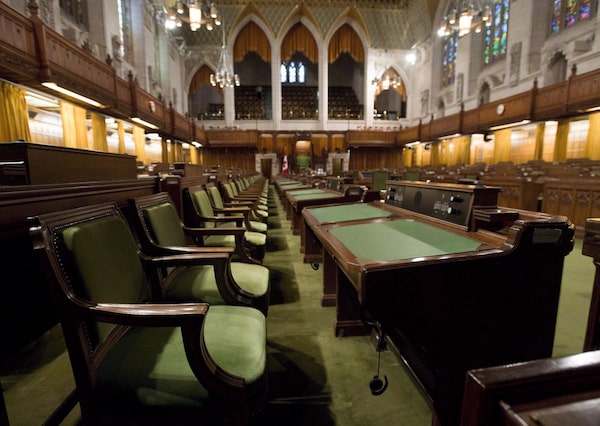
The House of Commons sits empty ahead the resumption of the session on Parliament Hill on Sept. 12, 2014 in Ottawa.Adrian Wyld/The Canadian Press
Mark Johnson is a general counsel who has worked in the private and public sectors. He was a Conservative candidate in Toronto in the 2021 federal election.
Here’s a quick question: How many former C-suite executives of large Canadian businesses now sit in the federal cabinet? In the House of Commons?
Stumped? The answer: almost none. Across all major parties, members of Parliament nearly exclusively have backgrounds in law, academia and various fields from the public sector.
While there are politicians with business experience, they either headed small firms or were not part of the C-suite at big ones. All are good training camps for political service, but as a collective, our MPs are conspicuously unrepresentative of Canada’s largest businesses.
Canada’s big business leaders must now show the same sense of public service as those from other walks of life. Usually ones to sit on the sidelines, it’s time for them to take a risk and get into the arena, whether by running for office or leading public opinion through other forms of political engagement.
Success in the corporate world by no means guarantees success in politics, as they are completely different fields. But there’s no doubt that the skills and perspectives acquired over the years by top executives would benefit Canada’s body politic.
Aided by structured decision making and a sense of perspective, top executives work in high-pressure, high-profile and high-conflict positions. They’re experienced with large, unpleasant decisions and the accompanying unpopularity that can result.
Skilled at accomplishing things in large complicated entities with competing departments, big budgets and large numbers of people, business leaders also know how to set long-range strategic goals for a large entity.
Michael Useem, a professor at the Wharton School of Business, says some business leadership skills are transferable to the political world.
“If you have held a prominent role in a substantial business you have learned how to mobilize, motivate and align the work of a lot of people. That ability is a learned skill. It’s not natural for most people,” he said in a Knowledge at Wharton article.
Why the need for business executives over those from the public sector? Public-sector chief executive insight and experience is provided to senior elected officials up through the bureaucratic hierarchy. Yet there can remain a huge gap in big business outlook and wisdom to inform political decisions. Presumably, former finance ministers Michael Wilson, Bill Morneau and Paul Martin with their business backgrounds, all contributed a business lens to political decisions.
To big business executives: getting involved means more than issuing a corporate statement or giving your staff a volunteer day at a charity. Canada’s political system doesn’t need to know about your company’s new policies or your own industry insight. Yes, those things are important but that’s the business playing a role, not you.
Our politics now needs you personally: your skills, your experience, your energy, your wisdom and your judgment. It needs you to show leadership, to risk a comfortable life, to get wounded, to run for office and get into the arena.
If elected office is too much of a commitment, then providing informed and measured public commentary on important, non-partisan, non-business issues such as foreign relations and education policy – as JPMorgan chief executive officer Jamie Dimon and Microsoft’s Bill Gates do – is equally important.
Well paid, successful executives at the apex of their careers and enjoying the finer things in life will need serious convincing to leave their stable existence to suffer the slings and arrows of outrageous political fortune. The barriers to entry can be high, but all parties at all levels of government should have meaningful recruitment efforts to this end.
If viewed as an investment, no responsible executive would make it. The downside risks are too great. But it’s not an investment. Public service is not a reward. It’s a sacrifice for the greater good. As prime minister John Diefenbaker once said: “I am asked – are there rewards in public life? There are – not monetary, but there is a tremendous satisfaction in being able to say I tried, I stood.”
Our once proud country is in bad shape. I worry for its future. Across all parties, in whatever capacity, big business leaders must do their part and offer their experience, skills and wisdom to turn things around.